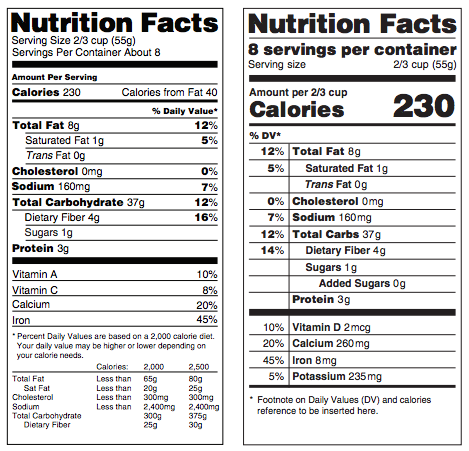WASHINGTON, Feb. 27, 2014 – The Obama administration today released a revamped version of the iconic Nutrition Facts label, which includes more prominent calorie information, more specific calorie-per-serving facts, and a new line for “added sugars.”
The proposed changes are being praised for the most part by consumer advocates, who complain that the current label is too cluttered and doesn’t provide Americans with the information they need to eat healthily. The plan would be the first major update of the label since 1994, when it was first released.

“This is good news for consumers,” said Chris Waldrop, director of the Food Policy Institute at the Consumer Federation of America. “Updating the Nutrition Facts panel will provide consumers with more relevant and useful information about the foods they consume.”
The industry and government watchdog Center for Science in the Public Interest (CSPI) gave the proposal “mostly high marks,” especially the decision to make calorie counts more prominent. However, it said the “added sugar” line should be expanded to include the percentage of the daily recommended consumption figure in a serving, not just the number of grams, allowing consumers to put the added information into perspective.
CSPI will also be focusing on the sodium line of the label. Though some health advocates had pushed FDA to dramatically decrease its daily recommended sodium intake, the new label drops the figure by just 100 mg, from 2,400 mg to 2,300, pleasing the food industry.
The proposed label also eliminates “calories from fat” information and some vitamin details (including vitamins A and C) in favor of new label lines on potassium and vitamin D. Experts say potassium helps control blood pressure; vitamin D is essential to bone development.
The food industry so far has had little to say about today’s announcement. In a statement, a spokeswoman for the Food Marketing Institute, which represents retailers and wholesalers, said the group “envisions consumers will only continue to demand nutrition information that is both easy to understand and accessible.” According to FMI research, two-thirds of shoppers say they read nutrition labels in the store.
The Grocery Manufactures Association, meanwhile, said in a statement that it looked “forward” to working with the FDA and other stakeholders as the proposed updates make their way through the rule-making process. The group said it wants to make sure “any changes are based on the most current and reliable science.”
The public now has 90 days to comment on the proposed revisions before FDA finalizes any changes. The industry would then have two years to comply, according to the FDA plan.
First Lady Michelle Obama, who was on hand at the White House today to officially unveil the changes, said she hopes the revised label would cut down on confusion and help American families to make healthier choices.
She said the label would help busy parents in the grocery aisle, who are familiar with the “stream of questions and worries running through your head when all you really wanted to know was, ‘Should I be eating this or not?’”
“But unless you had a thesaurus, a calculator, a microscope, or a degree in nutrition, you were out of luck,” she said of the current label.
#30
For more news, visit www.agri-pulse.com.

